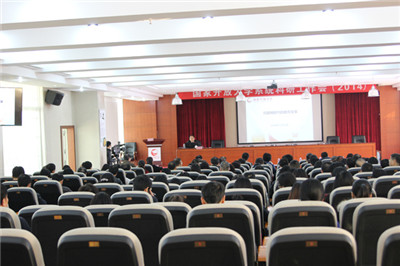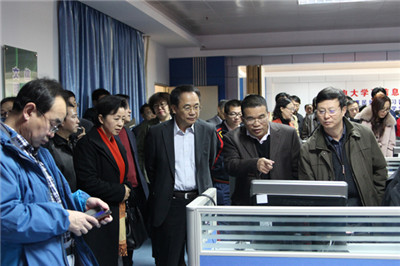 December 12-13, 2014 saw the convening of the 2014 OUC System Scientific Research Work Conference in Huizhou, Guangdong. The theme was Educational Change in the Internet Age. Nearly 100 representatives from the Open University of China (OUC) and its 42 branches gathered for meetings and discussions on advancing online scientific research and its management.
December 12-13, 2014 saw the convening of the 2014 OUC System Scientific Research Work Conference in Huizhou, Guangdong. The theme was Educational Change in the Internet Age. Nearly 100 representatives from the Open University of China (OUC) and its 42 branches gathered for meetings and discussions on advancing online scientific research and its management.
Secretary General Zhou Yuenian of the CPC Huizhou City Committee, Deputy Director Zeng Xiaohui of Huizhou City Education Bureau and President Liu Wenqing of Guangdong Open University attended the conference and gave speeches. President Yang Zhijian and Vice President Zhang Shaogang of the OUC also attended the conference. Director Wang Ying of the OUC Research Institute of Open and Distance Education (Scientific Research and Management Department) chaired the conference.
Yang Zhijian delivered a keynote speech titled “Educational Change in the Internet Age”. Yang underlined that scientific research is a major function of universities and embodies their essential features. In the transition from radio and TV universities to open universities, scientific research must be energetically promoted and research technologies closely integrated with education.
Yang Zhijian spoke about his understanding of the Internet age, his experience gained from revolutionary events in the current education domain, and his view on the upgrading and transformation of universities against this background. He suggested that in the Internet age the boundary between the virtual world and the real world has blurred, and a new cultural and ecological environment is coming into being. He introduced the “cloud-network-terminal” configuration, the “six-network integration” teaching model and its progress in practical exploration.
Zhang Shaogang summarized scientific research work in 2014 from perspectives including system construction, two-dimensional thought in scientific research in teaching, scientific research input, training improvement and scientific research activities. He emphasized that the focus of scientific research is “openness”, and that full play should be given to its systematic advantages, as well as integrating the concepts of “crowdsourcing” and “system linkage” into scientific research work. Expert teams will play a better role in future scientific research work, including think tanks and academic committee.
Deputy Director Chen Shougang of the Scientific Research and Management Department gave a work report entitled “The Advancement of the OUC Online Scientific Research Work”. President Sun Xianmin of Heilongjiang RTVU and Vice President Jin Lixia of Jiangsu Open University gave special reports entitled “Taking Multiple Measures for Synergy in an Effort to Improve the Quality of Scientific Research” and “Thoughts on Developing Models for Online Scientific Research and Management” respectively. Ms Li Juan from Shanghai Open University and Mr. Zhu Xiaochuan from Chongqing RTVU also shared their thoughts on online teaching and learning.
Deputy Director Wei Shunping of the OUC Research and Development Centre for Digital Learning gave the report “An Exploration of Online Research Models: An Example of the Construction and Application of the I-3D Printing Lab” via videoconferencing, giving the participants in Huizhou a remote tour of the i-3d printing lab in Beijing’s Zhongguangcun.
Commendations were also given to the winners of the Sixth Outstanding Scientific Research Achievement Prize at the conference. Ms Zhang Yuhua from Gansu RTVU and Ms Huang Meichu from Xiaoshan RTVU gave speeches on behalf of the winners and shared their experiences and impressions of cooperation, creation and sharing during the course of scientific research.
This conference was broadcast live via WeChat so that scientific research workers across the OUC system could attend the conference “in person”.

Conference Site

Attendees Visiting Huizhou RTVU
By He Jing, the OUC